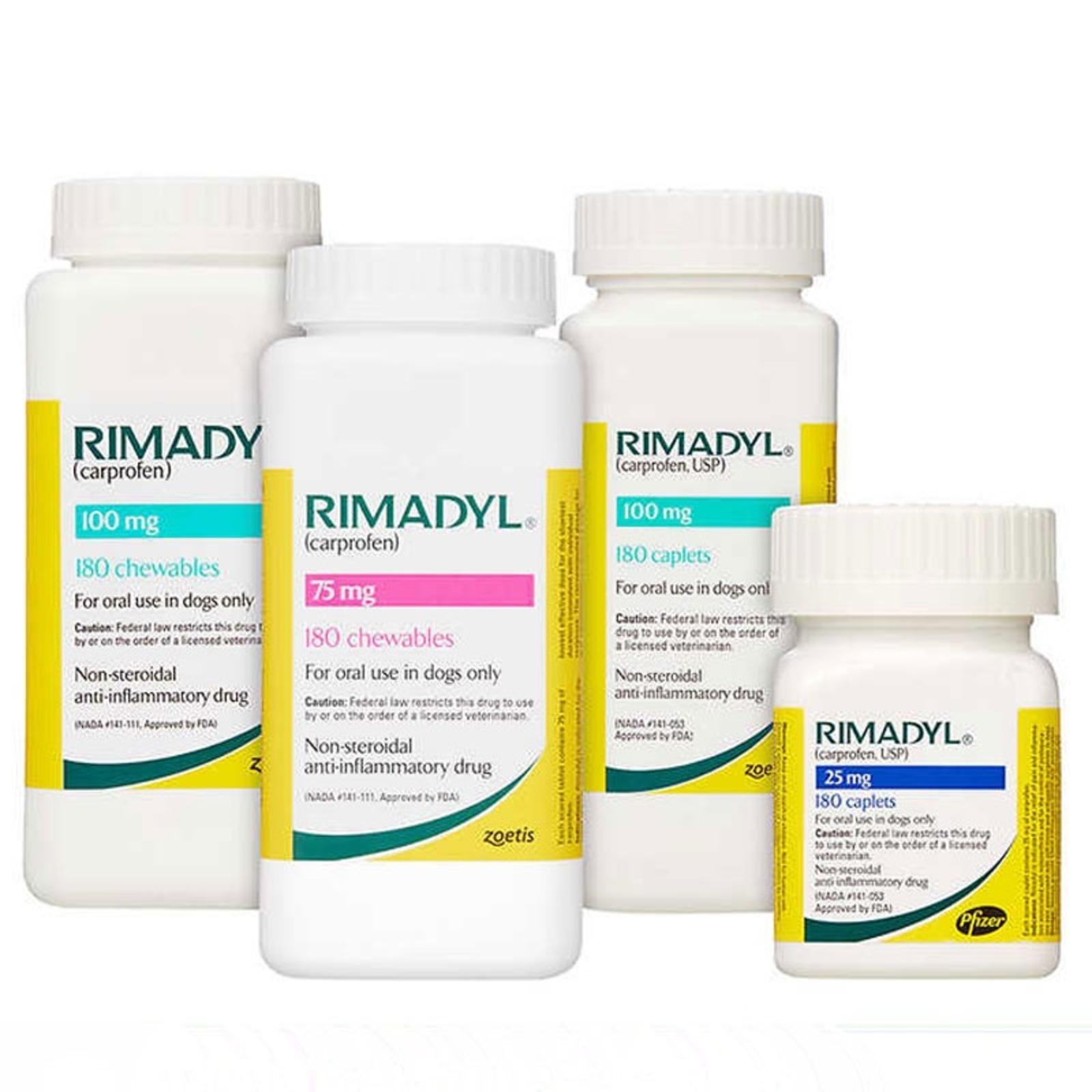Zoetis — Rimadyl Chewable Tablets 25 mg (Rx)

$70.43
10000313
Please note that this item requires a veterinarian's prescription.
Convenient ways to do that are:
Convenient ways to do that are:
- Your veterinarian can contact us by fax/phone.
- Create an account or simply sign in if you have a prescription already on file.
Vaccine and Rx items are not returnable.
About This Product

SKU024742
EID 10000313
BrandZoetis
Rimadyl is indicated for the relief of pain and inflammation in dogs. Rimadyl was shown to be clinically effective for the relief of signs associated with osteoarthritis, and for the control of postoperative pain following orthopedic and soft tissue surgery, in dogs.
DOSAGE & ADMINISTRATION
Osteoarthritis: 4.4 mg carprofen per kg of body weight administered orally once daily, or in divided doses of 2.2 mg/kg twice daily.
For the control of postoperative pain: 4.4 mg carprofen per kg of body weight administered orally once daily.
Tablets are scored and dosage should be calculated in half-tablet increments. Tablets can be halved by placing the tablet on a hard surface and pressing down on both sides of the score. Rimadyl chewable tablets are palatable and willingly consumed by most dogs. Therefore, they may be fed by hand or placed on food.
CONTRAINDICATIONS & WARNINGS
Contraindications:
Rimadyl should not be used in dogs exhibiting previous hypersensitivity to carprofen.
Rimadyl should not be used in dogs exhibiting previous hypersensitivity to carprofen.
Cautions:
As a class, cyclo-oxygenase inhibitory NSAIDs may be associated with gastrointestinal and renal toxicity. NSAIDs decrease prostaglandin production and inhibit the enzyme cyclo-oxygenase which leads to formation of prostaglandins from arachidonic acid. While NSAIDs inhibit prostaglandins that promote inflammation, they may also inhibit prostaglandins which maintain normal function. These anti-prostaglandin effects may result in clinically significant disease in patients with underlying or pre-existing disease more often than in healthy patients. NSAID therapy could therefore reveal the presence of disease which has been previously undiagnosed due to the absence of clinical signs. Patients with underlying renal disease for example, may experience exacerbation or decompensation of their renal disease while on NSAID therapy.11-14 The use of parenteral fluids during surgery should be considered to reduce the potential risk of renal complications when using NSAIDs perioperatively.
As a class, cyclo-oxygenase inhibitory NSAIDs may be associated with gastrointestinal and renal toxicity. NSAIDs decrease prostaglandin production and inhibit the enzyme cyclo-oxygenase which leads to formation of prostaglandins from arachidonic acid. While NSAIDs inhibit prostaglandins that promote inflammation, they may also inhibit prostaglandins which maintain normal function. These anti-prostaglandin effects may result in clinically significant disease in patients with underlying or pre-existing disease more often than in healthy patients. NSAID therapy could therefore reveal the presence of disease which has been previously undiagnosed due to the absence of clinical signs. Patients with underlying renal disease for example, may experience exacerbation or decompensation of their renal disease while on NSAID therapy.11-14 The use of parenteral fluids during surgery should be considered to reduce the potential risk of renal complications when using NSAIDs perioperatively.
Carprofen is an NSAID and, as with others in that class, adverse reactions may occur with its use. The most frequently reported effects have been gastrointestinal signs. Events involving suspected renal, hematologic, neurologic, dermatologic, and hepatic effects have also been reported. Patients at greatest risk for renal toxicity are those that are dehydrated, on concomitant diuretic therapy, or those with renal, cardiovascular, and/or hepatic dysfunction. Since many NSAIDs possess the potential to induce gastrointestinal ulceration, concomitant use of Rimadyl with other anti-inflammatory drugs, such as corticosteroids and NSAIDs, should be avoided or very closely monitored. Although the drug class has been associated with renal toxicity and gastrointestinal ulceration, Rimadyl treatment did not produce these effects in well-controlled safety studies of up to ten times the dose in dogs.
All dogs should undergo a thorough history and physical examination before initiation of NSAID therapy. Appropriate laboratory tests to establish hematological and serum biochemical baseline data prior to, and periodically during, administration of any NSAID should be considered in some patients. Dogs receiving Rimadyl should be observed for signs of drug intolerance, such as inappetence, vomiting, diarrhea, melena, polyuria/polydipsia, anemia, jaundice, lethargy, ataxia, seizure, or behavioral changes. Susceptibility to drug-associated adverse effects varies with the individual patient. Recognition of possible drug-related clinical signs followed by cessation of drug therapy, and by supportive therapy if appropriate, will improve patient recovery. The side effects of this drug class, in rare situations, may be serious, and if corrective action is not taken may result in hospitalization or even fatal outcomes.
Rimadyl is not recommended for use in dogs with bleeding disorders (e.g., Von Willebrand’s disease), as safety has not been established in dogs with these disorders. The safe use of Rimadyl in animals less than 6 weeks of age, pregnant dogs, dogs used for breeding purposes, or in lactating bitches has not been established. Studies to determine the activity of Rimadyl when administered concomitantly with other protein-bound or similarly metabolized drugs have not been conducted. Drug compatibility should be monitored closely in patients requiring additional therapy. Such drugs commonly used include cardiac, anticonvulsant and behavioral medications. It has been suggested that treatment with carprofen may reduce the level of inhalant anesthetics needed.15 If additional pain medication is warranted after administration of the total daily dose of Rimadyl, alternative analgesia should be considered. The use of another NSAID is not recommended.
Due to the palatable nature of Rimadyl chewable tablets, store out of reach of dogs in a secured location. Severe adverse reactions may occur if large quantities of tablets are ingested.
Do not use in cats.
PHARMACEUTICAL PRECAUTIONS
Store at a temperature between 15 and 30°C.
FURTHER INFORMATION
Presentation:
Rimadyl chewable tablets are scored, and contain 25 mg, 75 mg, or 100 mg of carprofen per tablet. Each tablet size is packaged in bottles containing 60, 30 or 180 tablets.